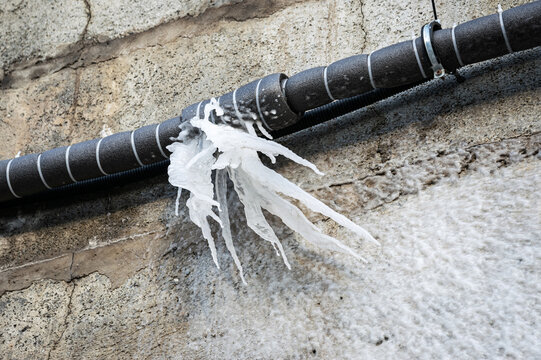Advice for Preventing Frozen Pipes in Winter: Professional Insights
Advice for Preventing Frozen Pipes in Winter: Professional Insights
Blog Article
How do you feel about How To Avoid Freezing Pipes?

Cold weather can ruin your plumbing, specifically by freezing pipes. Below's how to avoid it from happening and what to do if it does.
Introduction
As temperature levels decrease, the threat of icy pipelines boosts, potentially leading to pricey repair work and water damage. Comprehending just how to avoid frozen pipelines is essential for house owners in cold climates.
Understanding Frozen Pipelines
What causes pipes to ice up?
Pipes freeze when revealed to temperatures listed below 32 ° F (0 ° C) for extended periods. As water inside the pipelines ices up, it broadens, taxing the pipeline wall surfaces and potentially causing them to rupture.
Threats and problems
Frozen pipes can result in water supply interruptions, residential property damage, and expensive repair services. Ruptured pipelines can flooding homes and cause substantial architectural damage.
Indicators of Frozen Pipeline
Recognizing icy pipelines early can stop them from breaking.
Just how to identify icy pipes
Seek decreased water circulation from taps, uncommon smells or noises from pipelines, and noticeable frost on subjected pipes.
Prevention Tips
Insulating vulnerable pipes
Cover pipelines in insulation sleeves or make use of warmth tape to safeguard them from freezing temperatures. Focus on pipes in unheated or external areas of the home.
Home heating techniques
Keep indoor rooms effectively heated up, especially locations with pipes. Open up cabinet doors to allow cozy air to flow around pipelines under sinks.
Shielding Outdoor Pipes
Garden hoses and exterior faucets
Disconnect and drain pipes garden pipes prior to winter months. Install frost-proof spigots or cover outdoor faucets with shielded caps.
What to Do If Your Pipelines Freeze
Immediate actions to take
If you presume icy pipes, keep faucets available to ease stress as the ice melts. Utilize a hairdryer or towels soaked in warm water to thaw pipes slowly.
Long-Term Solutions
Structural adjustments
Think about rerouting pipes far from exterior wall surfaces or unheated locations. Include extra insulation to attics, basements, and crawl spaces.
Updating insulation
Invest in high-grade insulation for pipelines, attic rooms, and walls. Appropriate insulation assists preserve consistent temperature levels and lowers the threat of frozen pipelines.
Verdict
Preventing icy pipelines requires positive actions and fast responses. By understanding the reasons, signs, and safety nets, house owners can shield their pipes throughout cold weather.
Helpful Tips to Prevent Frozen Pipes this Winter
UNDERSTANDING THE BASICS: WHY PIPES FREEZE AND WHY IT’S A PROBLEM
Water freezing inside pipes is common during the winter months, but understanding why pipes freeze, and the potential problems it can cause is crucial in preventing such incidents. This section will delve into the basics of why pipes freeze and the associated problems that may arise.
THE SCIENCE BEHIND FROZEN PIPES
When water reaches freezing temperatures, it undergoes a physical transformation and solidifies into ice. This expansion of water as it freezes is the primary reason pipes can burst. As the water inside the pipe freezes, it expands, creating immense pressure on the walls. If the pressure becomes too great, the pipe can crack or rupture, leading to leaks and water damage.
FACTORS THAT CONTRIBUTE TO PIPE FREEZING
Low Temperatures: Extremely cold weather, especially below freezing, increases the risk of pipes freezing. Uninsulated or Poorly Insulated Pipes: Pipes located in unheated areas, such as basements, crawl spaces, or attics, are more prone to freezing. Insufficient insulation or lack of insulation altogether exacerbates the problem. Exterior Wall Exposure: Pipes running along exterior walls are susceptible to freezing as they encounter colder temperatures outside. Lack of Heating or Temperature Regulation: Inadequate heating or inconsistent temperature control in your home can contribute to frozen pipes. PROBLEMS CAUSED BY FROZEN PIPES
- Pipe Bursting: As mentioned earlier, the expansion of water as it freezes can cause pipes to burst, resulting in significant water damage.
- Water Damage: When pipes burst, it can lead to flooding and water damage to your property, including walls, ceilings, flooring, and personal belongings.
- Structural Damage: Prolonged exposure to water from burst pipes can compromise the structural integrity of your home, leading to costly repairs.
- Mold and Mildew Growth: Excess moisture from water damage can create a favorable environment for mold and mildew growth, posing health risks to occupants.
- Disrupted Water Supply: Frozen pipes can also result in a complete or partial loss of water supply until the issue is resolved.
WHY CERTAIN PIPES ARE MORE PRONE TO FREEZING
- Location: Pipes located in unheated or poorly insulated areas, such as basements, crawl spaces, attics, or exterior walls, are at higher risk of freezing.
- Exterior Pipes: Outdoor pipes, such as those used for irrigation or exposed plumbing, are particularly vulnerable to freezing as they are directly exposed to the elements.
- Supply Lines: Pipes that carry water from the main water supply into your home, including the main water line, are critical to protect as freezing in these lines can affect your entire plumbing system.
- Underground Pipes: Pipes buried underground, such as those connected to sprinkler systems or outdoor faucets, can be susceptible to freezing if not properly insulated.
https://busybusy.com/blog/helpful-tips-to-prevent-frozen-pipes-this-winter/

As a fervent person who reads about Winter Plumbing Precautions: Preventing Frozen Pipes, I imagined sharing that excerpt was worth the trouble. Those who enjoyed reading our blog entry if you please remember to pass it around. Thank you for being here. Come back soon.
Rates Report this page